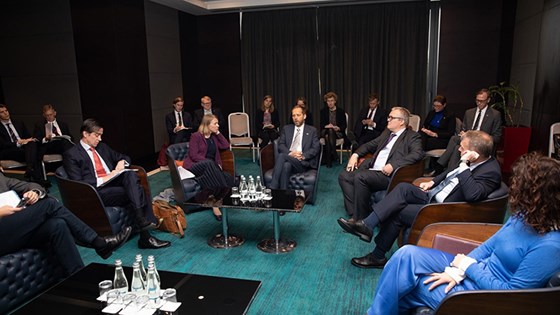Foreign Minister Huitfeldt in Moldova
News story | Date: 27/04/2023 | Ministry of Foreign Affairs
Minister of Foreign Affairs Anniken Huitfeldt is taking part today in the Nordic-Baltic (NB8) Foreign Ministers’ meeting in the Moldovan capital Chişinău. This is the first time Ms Huitfeldt and the other Nordic-Baltic Foreign Ministers have visited Moldova, a neighbouring country to Ukraine, since the war started.

Moldova is one of the poorest countries in Europe and is the neighbouring country that has been most seriously affected by the war in Ukraine. Ms Huitfeldt and the Foreign Ministers of the other Nordic-Baltic countries are visiting Moldova to show their support. The Foreign Ministers will have meetings with Moldova’s President Maia Sandu, Prime Minster Dorin Recean, Minister of Foreign Affairs Nicu Popescu and the President of the Moldovan Parliament.
According to the UN Refugee Agency, some 790 000 refugees have so far fled from Ukraine to Moldova, and approximately 103 000 of them are still in the country.
‘Moldova has shown remarkable solidarity with the Ukrainian refugees. The Moldovan people have quite literally opened their homes in solidarity with Ukraine. According to the UN, more than 22 000 families in Moldova have taken Ukrainian refugees into their homes,’ said Minister of Foreign Affairs Anniken Huitfeldt.
Moldova will be receiving funding from Norway under the NOK 75 billion multi-year Nansen Support Programme for Ukraine, which was launched in February this year. Moldova has also received other support from Norway since the war in Ukraine began.
‘So far, Norway has provided NOK 472.4 million to alleviate the refugee crisis in Moldova. This has helped to deliver direct assistance to vulnerable families. Funding from Norway is also being used to support the 22 000 Moldovan host families who have taken in women, children and elderly people fleeing from Ukraine. The Norwegian funding is being channelled through the UN and Norwegian humanitarian organisations,’ said Ms Huitfeldt.
‘The authorities in Moldova are working closely with the UN and donors to ensure that the refugees are integrated into society, are able to attend school, find work, and have access to health care and social services,’ said Ms Huitfeldt.
The Moldovan authorities are also working to strengthen the country’s own capacity to meet the needs of vulnerable Moldovan families. A temporary support programme for this purpose was launched by the authorities in March.
In recent years, Norway’s support to Moldova has been targeted towards promoting democracy, the rule of law and human rights, as well as supporting efforts in the areas of energy efficiency, climate action and environmental protection. Since Russia’s invasion of Ukraine, Norway has significantly increased its funding to Moldova, particularly its humanitarian support for refugees and Moldovan host families. In 2022, Norway also provided NOK 150 million in budget support via the World Bank.
Moldova has chosen the path of Euro-Atlantic integration. In 2014, Moldova and the EU signed an Association Agreement, establishing a Deep and Comprehensive Free Trade Area (DCFTA). In June 2022, the EU granted candidate status to both Moldova and Ukraine.
‘Norway fully supports Moldova’s process of European integration. Stability and democracy in Moldova are important for Europe as a whole. Our support for Moldova enhances European security,’ said Ms Huitfeldt.
Moldova is facing a number of serious security challenges. Russian missiles have violated Moldovan airspace on multiple occasions and false bomb threats have led to the temporary closure of the international airport in Chişinău. The country is regularly subjected to cyber-attacks, Russian propaganda, and the spread of false news or misinformation, and is contending with unrest linked to developments in the frozen conflict in the breakaway region of Transnistria.
Facts about Norway’s support to Moldova
- In 2022, Norway provided a total of NOK 150 million in funding to support critical government services in Moldova.
- Norway provided NOK 261.9 million in humanitarian aid in 2022, and will provide a total of NOK 476 million in 2022 and 2023.
- Moldova will be receiving funding under the Nansen Support Programme for Ukraine, which will mean a further increase in Norway’s support to Moldova for 2023.